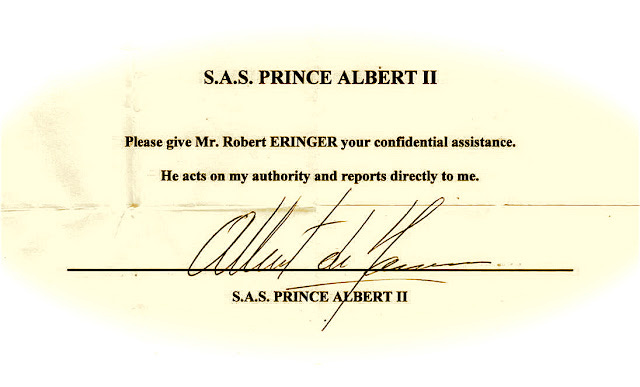June 2005
Ian M, formerly of SIS, arrived at M-Base the evening of June 1st at 9:30.
This thought occurred to me as the Det Collector drove us up to Hotel Hermitage: I not only knew Monaco’s biggest secrets, many of them were of my own making.
We waited in the bar.
Sergey of the FSB (or so he claimed) entered at 10:50 p.m. He conveyed a gruff, formidable persona if comically garbed in white slacks and shiny white loafers. He was accompanied by Oksana, his interpreter—and also his lover, it would later transpire.
Sergey spoke little English. He had jet-black (dyed) hair and misaligned eyes that eluded contact. He would look away when spoken to, affecting aloofness, as if he didn’t give a crap what anyone, except he, had to say.
As Ian told me later, “He’s ex-special forces. To get where he’s gotten, you have to crawl over broken glass and hot coals.”
Sergey alternated between cliché and proverb to pretend profundity.
The four of us ambled across Place du Casino to Café de Paris.
Sergey was not pleased with our choice of eatery. But at this late hour it was here or go hungry. He grunted a reluctant acquiescence and we sat in the open-air, ordered a bottle of red wine.
When the waiter tried to pour a glass for Oksana, Sergey snarled at her, “No.”
To further impress us with his command, Sergey told us he’d met the French prime minister earlier that day.
I outlined what we—our service—had in mind for a relationship.
Sergey said, Yeah, that’s fine, but I need to hear it from the prince.
“If he’s serious,” sneered Sergey, “there is much we can do. The prince has much trouble to deal with in Monaco.”
I replied, “At the risk of sounding immodest, that’s why I’m here.”
After four-and-half hours’ sleep, I prepared for a busy day.
My deputy positioned himself downstairs to greet Prince Albert, who arrived at 9:05.
Ian briefed Albert on Sergey, whom we expected any moment, and I provided the prince with written talking points:
1) We wish to open a secret, unofficial liaison with Russian special services to address our mutual concerns: organized crime, money laundering and terrorism.
2) Eringer is my intelligence advisor. Everything goes through him and he reports only to me. Eringer’s role, and his relationship with me, is completely separate from Monaco’s government structure. When you speak with him, it is like speaking with me.
3) We have no tolerance for terrorism finance in Monaco. If you have information that terrorists from Chechnya keep money in Monaco, we will work with you and take measures.
Ian offered an addendum: The Russians should not try any “wet stuff” against oligarchs on Monaco territory.
The prince scribbled on the bottom of the paper: No illegal actions in Monaco.
Ian descended to greet Sergey, leaving the prince and me to discuss other matters.
We needed a police contact with whom I could work, especially with regard to the investigation of finance minister Franck Biancheri.
The prince suggested Jean-Raymond Gottlieb, whom he phoned on the spot and told, “Eringer will call, give him anything he asks.”
The doorbell rang.
The prince lifted his right butt cheek and launched a thunderous cheezer.
“Sorry,” he said. “Had to let that one go before the General arrived.”
Sergey sauntered into the living room and actually smiled as he shook Prince Albert’s hand.
We took our seats around the table.
The prince ran through his talking points.
Sergey grunted.
I mentioned our interest in Alexey Fedorichev.
Sergey confirmed Fedorichev was bad, but added, “He has no blood on his hands—he can be controlled.”
I mentioned our Serbian target.
Sergey remained poker-faced and quiet until we provided him room to fill the silence.
“We can tame these people,” he finally said. “Or deal with them conclusively if you wish.”
Albert and I exchanged glances and, miraculously, kept our faces straight.
Two hours later, Ian brought Sergey and Oksana down to the port, where I’d chartered a small yacht for an afternoon cruise.
Sergey had worn a coat and tie for his princely meeting but now reverted to his white slacks, white loafers and matching white belt plus a jazzy silk shirt with blue stripes and black fish, unbuttoned halfway down his chest.
We cruised into Villefranche and berthed for lunch at La Mere Germaine: pouilly fume, lobster salad and grilled turbot.
Sergey warmed up significantly, mostly because he’d met the prince. In true Russian tradition, her offered about 15 toasts to this, that and everything else.
And he finally made eye contact, more of an eyeball grip, a challenge I always welcome.
We finished with flaming crepes splashed with Grand Marnier and snifters of a 1975 Armagnac.
Ian told Sergey, “When you do your traces on Robert, you will probably find interesting things” (as in, FBI counterintelligence, fooling his comrades with ruses) “but the road of life has brought him here and he is not connected to either the US or UK government. He works only for the prince.”
During a stroll at our last stop—Menton, near the border with Italy— Sergey draped his arm around my shoulder and invited me to his 50th birthday party come November in Moscow. (My undercover operations for the FBI a few years earlier precluded any such traveling to Russia.)
Sergey treated me like his new best friend, but everything he told me had been carefully calculated.
I asked after former KGB chairman Vladimir Kryuchkov, one of the comrades I’d rused for the FBI while targeting CIA defector Edward Lee Howard.
“Getting old, unwell, hospital recently,” replied Sergey. “No influence anymore.”
Prince Albert returned to M-Base the following afternoon for a meeting with EJ, Latvia’s interior minister, telling him, as he had Sergey, “Cracking down on corruption and organized crime will be a priority of my reign.”
(This was a mantra he seemed serious about… until he got talked out of it down the road.)
EJ departed after 20 minutes, delighted to have engaged his country in a covert relationship with the prince—and why not?
The glamorous principality was a magnet for money and intrigue; it was a no-brainer that intelligence services of other countries should want to get to know us, on two levels:
1) Legitimate strategic interests, usually related to money laundering.
2) It is a heck of a nice place to visit at government expense.
With 125 nationalities squeezed into the second smallest country in the world, and most of its occupants rich from dirty deals, coupled with a highly confidential banking system, Monaco is an investigator’s paradise—a holy grail for intelligence work.
I thrilled Albert with anecdotes about cruising the Med with Sergey, whom we agreed was a piece of work.
Although the Russian had shown little reaction to our Serbian target’s name when broached in M-Base, he’d pointed out to me the Serbian's large villa on Cap Martin from the boat.
My role as intelligence chief—dealing with strange characters, investigating corrupt insiders without official status—was putting me into potentially precarious territory. Especially since the only person who could get me out of trouble if, say, the French detained me going in or out of Nice Airport, was the prince—and he was not the easiest person in the world to reach.
So I asked Albert to write a note I could carry in my wallet, a kind of Get out of jail free card.
While EJ was still in town, I briefed him on our Serbian, who had business interests in Latvia.
My objective with this individual, as with all bad actors, was to motivate other services to watch and monitor, build files, cooperate, possibly prosecute, possibly recruit, or at the very least make the world smaller for them.






